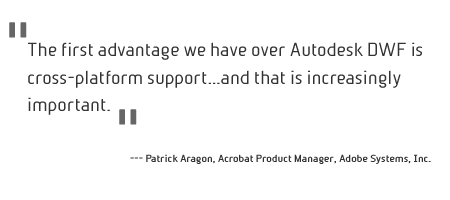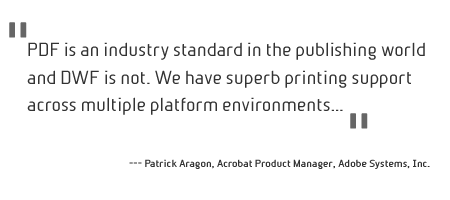|
page:
| 1 | 2 | 3 |
From
Adobe's specifications third-party software developers
can create their own PDF code libraries which other third-party
software companies can license to create competitive
products to Acrobat. So in the PDF market you have developers
making apps and developers making library tools to help
others make apps -- all designed to compete with Adobe
in some respects within the Acrobat PDF economy.
While
the embrace of file formats that are 'open standards'
are an ideal match for Adobe with PDF, the company's
latest product, Acrobat 3D, goes way beyond .u3d for
3d CAD file format compatibility.
Adobe
even goes one step further. "We provide an SDK (software
developement kit) to developers," says Patrick Aragon,
"which will enable them to do various things from within
their application if Acrobat is present on the desktop."
The company's SDK is C language-based and -- like just
about everything else -- is provided for Mac and Linux
as well as Windows. It also leverages industry standards-based
Javascript technology to interact with forms and do 3d
walk-throughs for instance.

Adobe
versus Autodesk:
These
days Adobe is up against Autodesk as a new challenger
to the ubiquitous PDF format both on the Internet and
in CAD markets specifically. Autodesk is a formative
foe; both companies are similar in size and resources,
though Adobe is a slightly bigger company -- and with
its new Macromedia acquisition gains significantly important
technologies. I asked Patrick Aragon how Adobe was going
to address this challenge and what Acrobat PDF's natural
advantages were.
"The
first advantage we have over Autodesk DWF is cross-platform
support," says Aragon, "and that is increasingly important."
And he adds: "The second advantage we have is our ubiquity
across a wide array of operating systems." "DWF has actually
been available in some form for nearly ten years and
today they only have about 9 million downloads. Compare
that to Adobe Acrobat 7 where in the first 17 weeks alone
we had close to 35 million downloads." As noted
earlier in the article, there is no denying the prevalence
of
Acrobat's numbers. There are 1.52 billion copies of Acrobat
Reader in the circulation.

It
is noteworthy to recognize that when asked what advantages
Adobe has over Autodesk with PDF, Patrick
starts with its cross-platform support. And this may
be the ultimate advantage, the one that decides the outcome
years from now. Adobe clearly recognizes the trends in
the OS (operating system) markets. (see Analysis section
at end of article for more on this).
But
besides the platform advantages, Adobe's Aragon says
there are several other key advantages over Autodesk
DWF. Secondly, he adds, "PDF
is an industry standard in the publishing world and DWF
is not. We have superb
printing
support across multiple platform environments and that
has benefited customers for years."
He continues
to explain that PDF also excels at archiving and search
because it has a rich meta data structure.
Autodesk DWF does not. Acrobat PDF also has the edge
in languages support and security. "We provide very
granular levels of security. We have a server product,
Adobe LifeCycle
Policy Server," says Aragon, "wherein administrators
can assign various levels of security to individuals."
Adobe's
technology advantages in Acrobat stem both from its long
life and from many of the company's core technologies
and applications. However, when I asked why so few really
understand what Acrobat Professional can really do he
said that is one of those efforts the company needs to
keep working on. Besides articles like this one, Aragon
said Adobe is working hard on doing outreach to people
in the industry to explain the advantages of Acrobat
PDF. "We do seminars or on-demand sessions on the Web,"
said Aragon.
Continued...>
page:
| 1 | 2 | 3 |
|






![]()
![]()